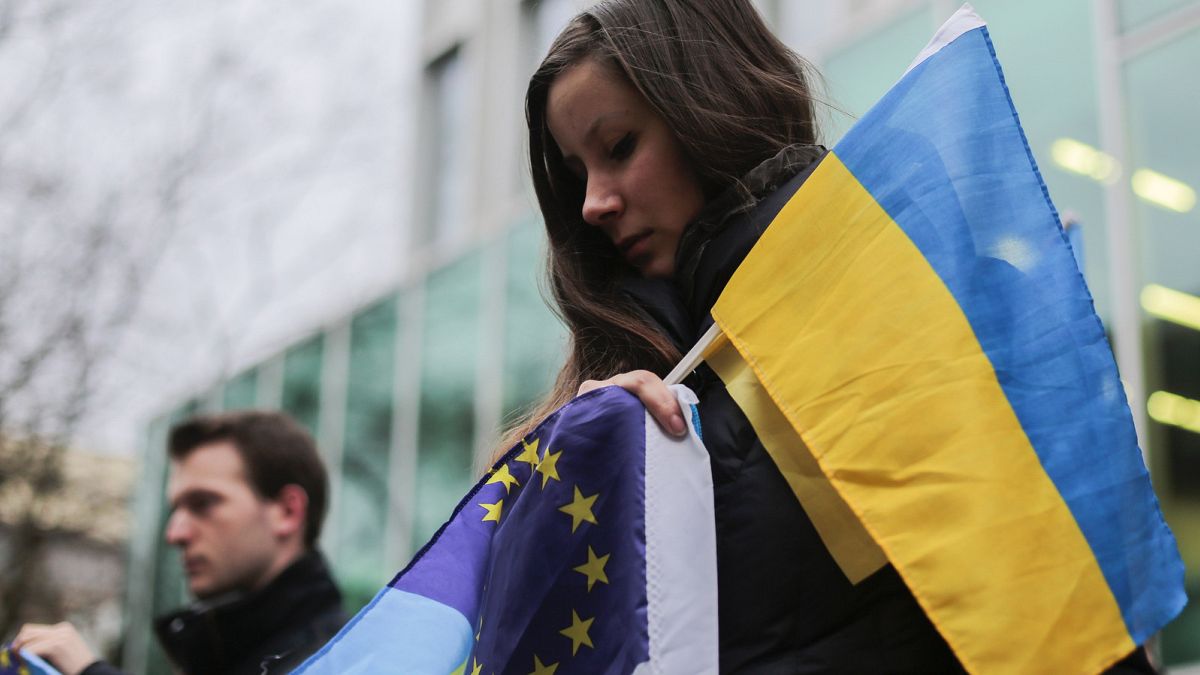New polling suggests public opinion on the potential enlargement of the European Union is divided, as leaders gear up for crunch decisions on candidate countries’ bids for EU membership this week.
According to a survey of six EU countries released Tuesday by the European Council on Foreign Relations (ECFR), there is no clear majority support for any of the current candidate countries joining the bloc soon, despite respondents being open-minded to the accession of Ukraine, Moldova, and Montenegro.
Views appeared to differ based on whether respondents are from "older" or "new" member states. The prevailing view in Austria, Germany, France and Denmark is that the EU should not add new members any time soon, while there is widespread support for enlargement in Poland and Romania.
The findings come as EU and Western Balkan leaders prepare to discuss enlargement in a summit in Brussels on Wednesday, and ahead of crunch decisions on advancing Ukraine, Moldova and Georgia’s accession bids later this week.
Ten countries in the EU’s neighbourhood are official or ‘potential’ candidates for accession to the 27-country bloc, including seven in the Western Balkans.
Russia's war against Ukraine has injected a sense of urgency into the traditionally sluggish process of approving new members, as the EU looks to fortify its geopolitical power by integrating its eastern flank.
The European Commission recommended opening formal membership talks with Ukraine and Moldova last month, pending the approval of EU leaders at a summit that kicks off on Thursday.
But Hungarian premier Viktor Orbán has expressed his steadfast opposition, threatening to veto the opening of talks with Ukraine and derailing EU plans to give a much-needed boost to Kyiv’s ambitions of becoming an EU member at a time when Western support to Ukraine is faltering.
Appetite for enlargement inconsistent
Across the countries surveyed by ECFR, 37% of respondents back Ukraine joining the EU, while 33% oppose.
Respondents were also open-minded to the membership of Moldova, which has so far been in lockstep with Kyiv in its bid, and Montenegro, considered the most advanced of the Western Balkan countries in aligning with the EU’s economic and foreign policies.
But a majority of respondents (51%) oppose Turkey joining the EU and opinion is divided on many Western Balkan countries - more than one in three oppose EU accession for Kosovo (37%), Serbia (35%) and Albania (35%).
Appetite for enlargement also fluctuates among the countries surveyed, with Austrians the most sceptical of all respondents.
Fifty-three per cent of Austrian respondents say they oppose the EU adding more members soon. A staggering 72% of Austrians oppose Turkey's accession, with over half also opposing the membership of Kosovo and Ukraine.
Respondents in Romania and Poland were overall much more open to new countries joining, with resistance at its highest in Romania to Ukraine (29% opposing) and in Poland to Turkey (26% opposing).
Opinion is not always split across the east-west or north-south divide, with Danish respondents most likely to back Ukraine’s EU membership. Fifty per cent of Danes think Kyiv should be able to join the bloc, dropping to a low of 28% in Austria.
Impact of Ukraine accession causes concern
The potential implications of Ukraine's accession to the European Union also worry Europeans. On average, 45% of survey respondents across all of the six countries surveyed fear the EU's security will be undermined if Ukraine becomes a member.
This is despite EU leaders claiming Ukraine's membership in the bloc is needed to protect the bloc's security and keep Putin's imperial ambitions in check.
Almost one in four (39%) also fear the bloc's economy would suffer with Ukraine as a member.
The possible integration of Ukraine - whose GDP per capita is three times smaller than that of Bulgaria, the EU's smallest economy - is sparking fears Kyiv would destabilise the bloc's budgetary structure and mean many EU countries would switch from net beneficiaries to net contributors.
Both Hungary's Viktor Orbán and Slovakian Prime Minister Robert Fico have also in the past expressed reservations about Ukraine's accession due to concerns about what they consider to be high levels of corruption in the country that could harm the EU's high anti-graft standards.
Despite the entrenchment of corruption, Ukrainian President Volodymyr Zelenskyy has made enormous efforts to comply with Brussels' anti-graft demands. A corruption crackdown in his government culminated in September when his defence minister Oleksii Reznikov left his post following multiple scandals involving the procurement of goods and equipment in his ministry.
The Commission exceptionally green-lighted the opening of talks with Ukraine and Moldova last month despite some reforms pending, including in Kyiv's case raising the the legal cap on the number of staff in its National Anti-Corruption Bureau, and giving its National Agency on Corruption Prevention more powers to verify the assets of public officials.
